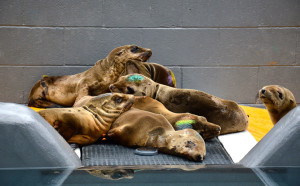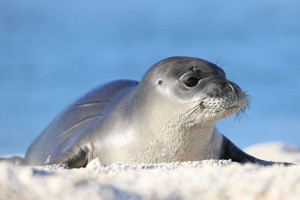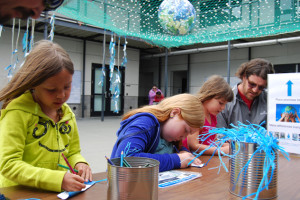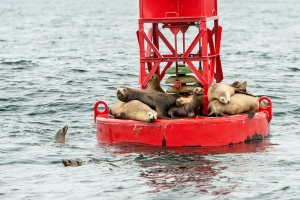In 1973, Jean-Michel Cousteau led 45 children into the dense bush of Papua New Guinea with the bare essentials: beans, rice, camping gear, swimming and diving equipment, a doctor — and a pig.
Cousteau, soon to be world-renowned conservationist and son of the legendary French ocean explorer Jacques Cousteau, wanted to teach them how to live off the land, as well as a major lesson of nature: there’s no such thing as waste. So, he had the kids throw their meal scraps to the pig, and at the end of the trip the pig itself became the meal.
The trip to Papua New Guinea was the second of many youth education programs led by Cousteau, whose latest event was hosted last Thursday by the Marine Mammal Center and the America’s Cup Healthy Oceans Project in the Marin Headlands.
The children in Papua New Guinea were reminded of their close connection with nature, and the difficult decisions they must face, something that has been lost in today’s mega supermarkets and fast-food consumer culture.
“In order to care about nature, people must understand how it works,” said Cousteau in a recent Bay Nature interview.
Cousteau attributes today’s environmental problems, such as the rapid accumulation of garbage in our seas, to a disconnect people have with nature. He believes youth education is the answer.
Gathered along the epic coastline of Rodeo Beach, Cousteau talked to children from Willow Creek Academy, in Sausalito, and Marshall Elementary, in San Francisco, about their role in sharing their experiences with others as an “ambassador for the ocean.” The children watched Cousteau assist with the release of three sea lions in rehabilitation at the Marine Mammal Center.
Cousteau believes that early experiences with nature, like participating in a sea lion release or living off the land in Papua New Guinea, will make children better decision-makers when it comes to the natural world.
“Educating the youth is the best investment we can make,” said Cousteau.
Cousteau also uses the power of film to connect people with nature. This week his latest documentary, “My Father, the Captain,” about the life of his famed father, will premiere at the Blue Ocean Film Festival in Monterey. And he’s just finished up a television show about fish bones, a waste product that’s become a resource in West Oakland, where it’s mixed with soil to neutralize contamination from the use of leaded gasoline before it was banned.
Though Cousteau’s work may highlight the somber truth that our oceans are in peril and human activity is to blame, his stories are all one of hope. Though it’s unknown what the solutions will be, the unknown excites Cousteau.
“We always look at these things as a catastrophe, as putting people out of work. That’s not the case,” he said.
To Cousteau, addressing our environmental problems brings new opportunities and a hope for a better future and society.
“People are going to come up with new ideas, new creations, new ways of handling things, new jobs, thousands of new jobs, new technology, and new industries,” he said.
[slideshow]
Athena, a juvenile male sea lion, was released on Rodeo Beach by the Marine Mammal Center after successfully recovering from a shark bite a month ago. He was rescued from Monterey Harbor and was one of three sea lions released as part of the youth education program hosted by the Marine Mammal Center and America’s Cup Healthy Oceans Project. Photos by Courtney Quirin.





